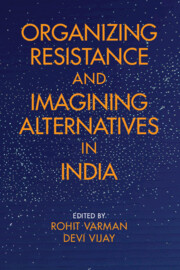Book contents
4 - Grounded in Reality, a Radically Alternative Future
Published online by Cambridge University Press: 30 June 2022
Summary
As India proceeds further into its eighth decade after independence, it is evidently deeply troubled. Every day the news channels shout out terrifying, gut-wrenching issues. Religious, racial, and caste hatred spawn a spate of killings and maiming, the state complicit in its eerie silence if not tacit encouragement. Air pollution epidemics affect millions. Plastics in rivers and lakes and cow's bellies, and pesticides in our food. No let-up in gender violence, domestic and elsewhere, with the rape and murder of little girls only the shocking tip of the iceberg. Adivasis and fishers and farmers and pastoralists, deliberately forgotten as the relics of the past, being displaced en masse for mines and industries and highways and amusement parks (the amusement being, of course, a prerogative of the rich). Financial scandals in which the swindling of hundreds of crores is now routine, almost boring, with how and where the swindler has escaped to becoming a point of greater interest. Species of wildlife being wiped out, and increasingly unpredictable climatic patterns. Politicians are reducing the world's largest elections (the latest in the summer of 2019) to farcical, bitter slanging matches devoid of the substance that political debates should be about. And the latest twist, the unprecedented slap in humanity's face by a tiny virus, with its own horrific consequences to the health and livelihoods of millions of Indians.
It is as if all the fundamental ills of our society were converging: caste, gender, and race-based oppressions coming to us from the past, capitalist class exploitation and state-sponsored violence against communities (in the name of ‘development’) as more recent additions, and, underlying these, an increasing alienation from the rest of nature. These ills do not necessarily locate themselves in the same set of oppressive people, nor are the oppressed always the same. Indeed, the status of ‘being oppressed’ and ‘being an oppressor’ sometimes merges confusingly into each other in the same individual or group. Therefore, it is more meaningful to locate the structures of power domination and not just individuals who currently control those structures to understand, challenge, and find alternatives to these structures and their various manifestations.
- Type
- Chapter
- Information
- Organizing Resistance and Imagining Alternatives in India , pp. 94 - 132Publisher: Cambridge University PressPrint publication year: 2022



